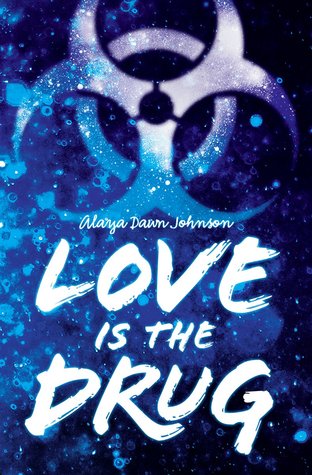 It’s no secret that I’m a HUGE Alaya Dawn Johnson fan. Her book, The Summer Prince, tied with John Green’s The Fault in Our Stars for the best book I read in 2013, and that’s high praise, as I read several fantastic books last year. So when I was given the chance to read her newest novel, Love is the Drug, before its official release date, I was floored, but nervous. What if it wasn’t as good as The Summer Prince? By the title alone I could tell it wasn’t going to resemble the fantasy-sci-fi-dystopian story I read and loved last year.
It’s no secret that I’m a HUGE Alaya Dawn Johnson fan. Her book, The Summer Prince, tied with John Green’s The Fault in Our Stars for the best book I read in 2013, and that’s high praise, as I read several fantastic books last year. So when I was given the chance to read her newest novel, Love is the Drug, before its official release date, I was floored, but nervous. What if it wasn’t as good as The Summer Prince? By the title alone I could tell it wasn’t going to resemble the fantasy-sci-fi-dystopian story I read and loved last year.
As soon as I opened it, however, I realized that I didn’t need to worry. This book is so fast-paced that I was caught up in the mystery after only a few sentences. I was right about one thing – the plot of Love is the Drug is nothing like that of The Summer Prince. Luckily, it’s just as good, so I had no problem getting absorbed in this new, and much closer to home, world Johnson created.
See, this story takes place in present-day Washington D.C., during a deadly flu pandemic, supposedly created and unleashed by South American terrorists. All Bird knows for sure is that she woke up in the hospital after saying the wrong thing to the right person, and now a dangerous branch of government security thinks she knows something dangerous… something worth silencing her over… something that could change everything.
Now a crazy government agent is trying to keep her quiet by threatening the one person she loves, a budding alchemist named Coffee, her parents just might be in on the whole thing, and on top of everything Bird is starting to really see what she’s spent her whole life ignoring – the status quo in the nation’s capital doesn’t really care about right and wrong and when things get tough equality is the first facade to drop.
I loved this story in part because of what’s sitting between the lines. Sure, it takes place in a made-up near-future society, and we’re not currently in the middle of a worldwide pandemic that’s threatening to bring the world to its knees. But there are some very uncomfortable truths in this book. There’s police brutality, frequent abuse of power, and plenty of social commentary centered around race relations in the U.S.
She already knew that one in three black men will go to prison in their lifetime, most of them for nonviolent drug offenses. But it was Coffee who told her that the work they did there was for private corporations. One prison in Louisiana is actually located on an old plantation, and the black men there pick cotton and corn for pennies an hour, just like their great-grandfathers.
In 1969, right before he launched the war on drugs, Nixon told one of his top aides: “You have to face the fact that the whole problem is really the blacks. The key is to devise a system that recognizes this while not appearing to.”
Now, I’m not pro-drugs or anything, and there is quite a lot of drug-usage in this novel. But that passage, particularly the quotation, is hard to read without cringing. It’s impossible to separate the plot of this novel from the many questions it raises about identity, race, and social equality in our country. I, for one, think that’s a good thing – Johnson frames her ideas and commentary with just the right amount of tact, and instead of coming off preachy, Love is the Drug strikes hard on your humanity while also delivering an intense storyline and plenty of steamy romance. Not to mention that the ending is simply liberating, tying everything together beautifully.
Rating: 5/5 stars
Overall Reaction: “Dang. Dang, dang, DANG. This is so messed up. Dang it. So. Freaking. Messed. Up. Aww, that’s so sweet. Dang, we’re back to the messed up.” And so on and so forth.